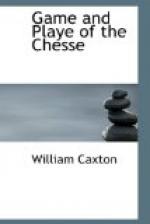remembrid of the right grete vilonye that he had don
to his frende and lord wythoute cause. He fyll
in dispayr and wold haue slayn hym self/ whan the
duc knewe and understode that/ he cam to hym and sayd
ne doubte the nothynge And swore to hym by his fayth/
that also well he was and shold be his frende fro
than forthon as euery he had ben to fore yf he wold
And thus he respited hym of his deth by his debonairte.
And in lyke wyse rede we of the kynge pirre to whom
was reported that they of tarente had said grete vilonye
of hym. For whiche cause he maad alle them to
come to fore hym And demanded of them yf they had so
sayd. Than oon of them answerd and sayd/ yf the
wyn and the candellys had not fayllyd/ thys langage
had ben but a Iape/ In regarde of that we had thought
to haue doon/ Than the kynge began to lawhe/ for they
had confessid that suche langage as was sayd and spoken
was by dronkenship/ And for this cause of debonairte
the peple of tarante toke for a custome that the dronken
men shold be puuysshyd/ And the sobre men preyfed.
The kynge than thus ought to loue humylyte and hate
falsite after the holy scripture that speketh of euery
man generally/ For the kynge in his royame representeth
god/ And god is verite/ And therfore hym ought to
saye no thynge but yf hit were veritable and stable.
Valerius reherceth that Alixandre wyth alle his ooste
rood for to destroye a cyte whyche was named lapsare/
whan than a phylosophre whiche had to name Anaximenes
which had ben to fore maistre & gouernour of Alixandre
herd and understood of his comyng Cam agayn Alixandre
for to desire and requyre of hym. And whan he
sawe Alixandre he supposid to haue axid his requefte/
Alixandre brake his demande to fore and swore to hym
to fore he axid ony thynge by his goddes. That
suche thynge as he axid or requyryd of hym/ he wold
in no wyse doon/ Than the philosopher requyred hym
to destroye the cyte/ whan Alixandre understood his
desire/ and the oth that he had maad/ he suffrid the
cyte to stande and not to be destroyed For he had
leuer doo his wyll than to be periured and forsworn
and doo agaynst his oth/ Quyntilian saith that no grete
man ne lord shold not swere/ but where as is grete
nede/ And that the symple parole or worde of a prynce
ought to be more stable than the oth of a marcha[=u]t/
Alas how kepe the prynces their promisses in thise
dayes/ not only her promises but their othes her fealis
and wrytynges & signes of their propre handes/ alle
faylleth god amende hit &c. A kynge also ought
to hate alle cruelte/ For we rede that neuer yet dyed
ony pietous persone of euyll deth ne cruell persone
of good deth Therfore recounteth valerius that ther
was a man named theryle a werke-man in metall/ that
made a boole of coppre and a lityll wyket on the side/
wherby men myght put in them that shuld be brent therin/
And hit was maad in suche manere/ that they that shold
be put and enclosid therin shold crye nothinge lyke
to the wys of a man but of an oxe. And this made




